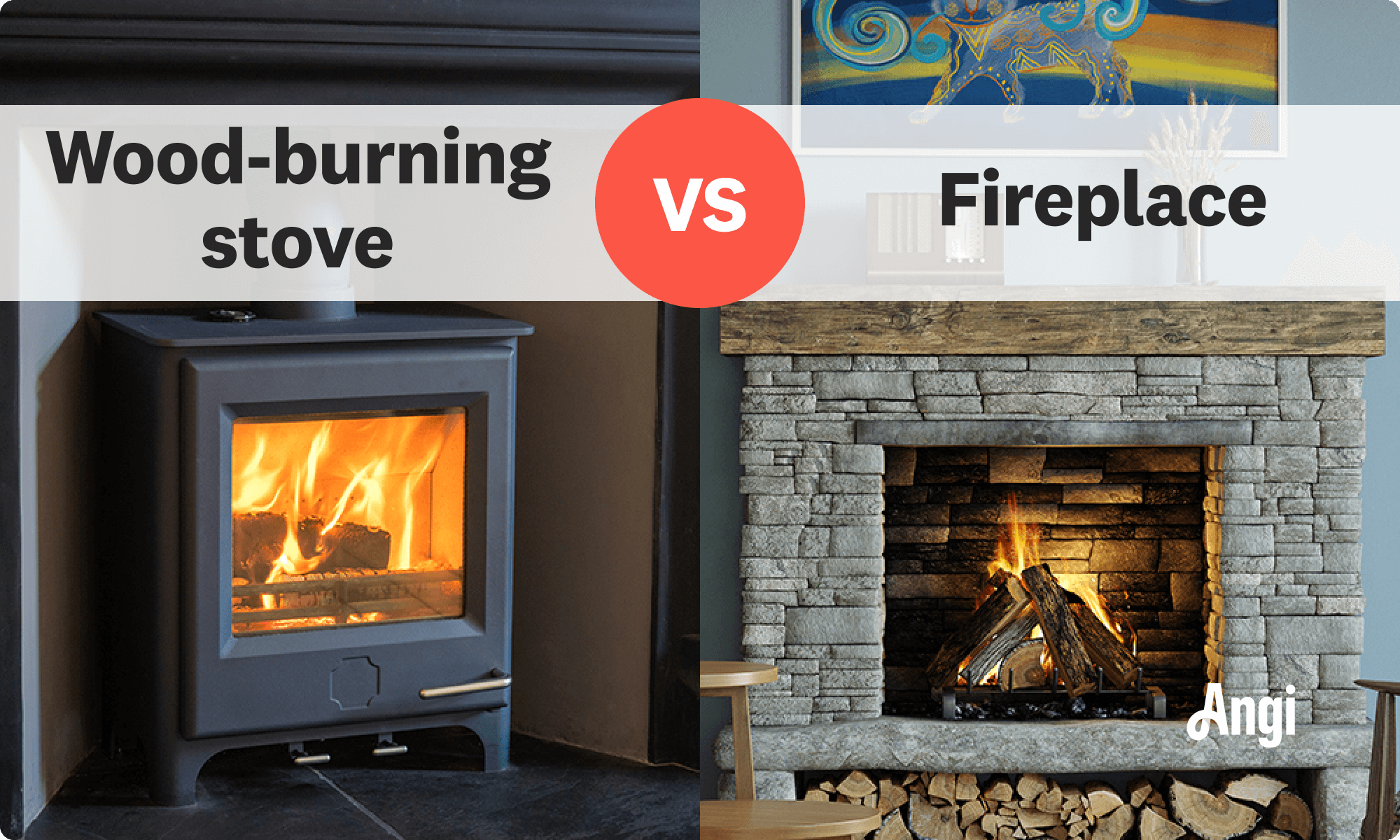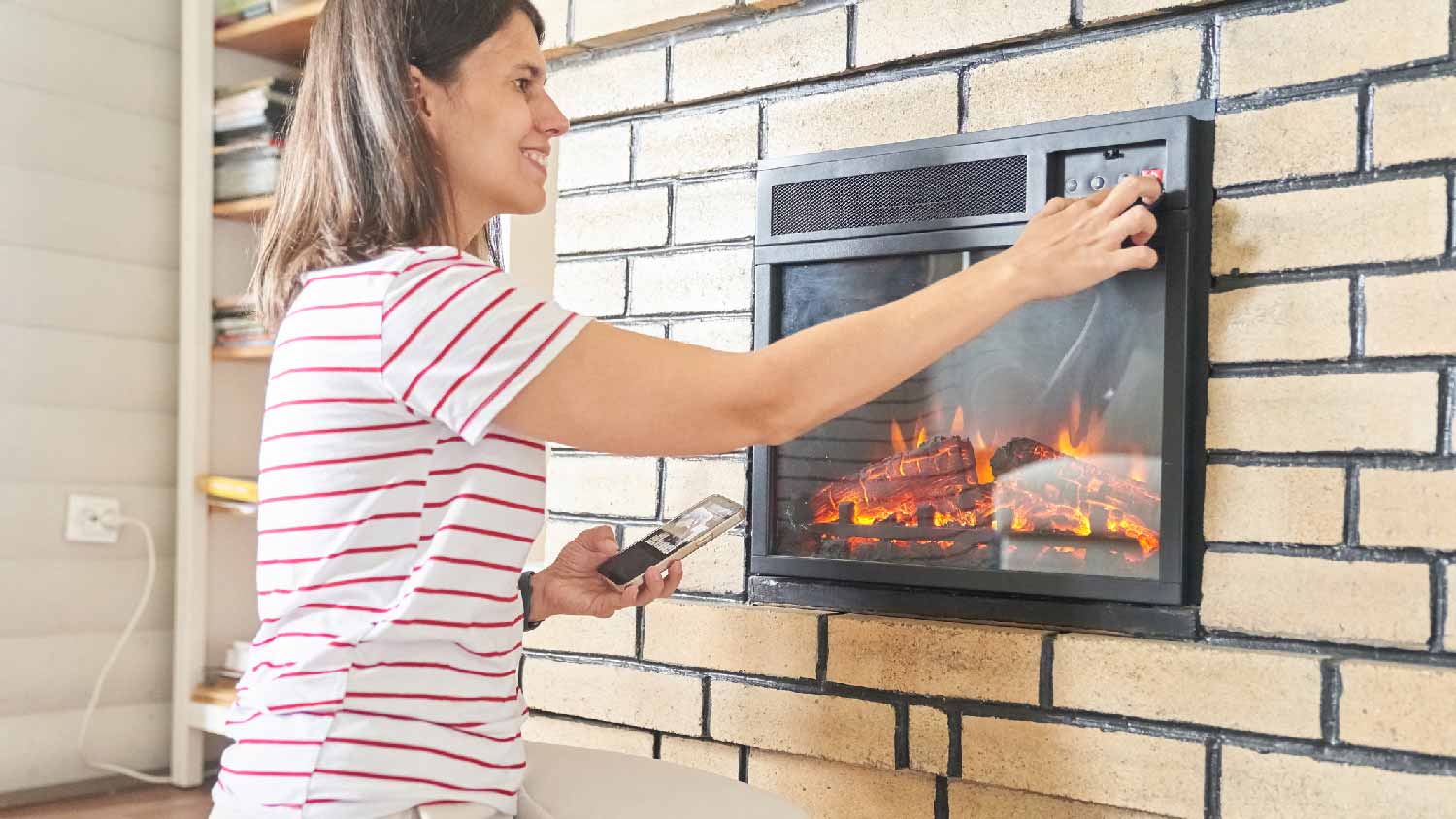How Much Does an Electric Fireplace Cost? [2025 Data]
The cost of installing an electric fireplace runs from $200 to $2,200, with homeowners spending $1,000 on average. Costs depend on size, heat output, style, and who does labor.


An electric fireplace adds cozy warmth to your home without breaking the bank. The cost of an electric fireplace can be anywhere from $200 to $2,200, though most people will pay around $1,000. Factors that affect the cost of an electric fireplace include the size, heat output, and whether it's a prefabricated or custom-made style.
Electric Fireplace Cost Breakdown
An electric fireplace costs an average of $1,000. Depending on the size and type of fireplace, you could spend as little as $100. High-end, custom models cost a few thousand dollars, with the most expensive models reaching $10,000. Often, though, electric fireplaces are less expensive than the cost of installing a fireplace or woodstove, which can run from $850 to $3,500.
Keep in mind that the cost of an electric fireplace doesn't include installation. Some models, such as freestanding or tabletop fireplaces, just need to be plugged in and turned on. Built-in models may need to be retrofitted into an existing fireplace and could require the help of a professional fireplace installer.
The bigger the fireplace and the more bells and whistles it has, the higher the price tag.
Electric Fireplace Size
The size of an electric fireplace influences its heating capabilities (often measured in BTUs, or British Thermal Units) and its price. A smaller electric fireplace may comfortably heat a 200- or 300-square-foot room but have little effect in a 500-square-foot room.
To account for the difference in heating ability, smaller models have lower prices. A small unit may cost $200. Meanwhile, a unit that can heat a 600-square-foot room may cost more than $1,500.
| Room Size in Sq. Ft. | BTUs Needed | Average Cost (Fireplace Only) |
|---|---|---|
| 300 | 3,000 | $500–$1,200 |
| 400 | 4,000 | $800–$1,600 |
| 500 | 5,000 | $1,000–$2,200 |
Wall-Mounted vs. Freestanding vs. Insert
Each type of electric fireplace has its merits and drawbacks. If you want your fireplace to be hardwired, you’ll need to call a local electrician for help if your fireplace pro didn’t set up the wiring. Learn more about each type of electric fireplace:
| Wall-Mounted Fireplace | Freestanding Fireplace | Insert Fireplace |
|---|---|---|
| $300–$2,000 | $200–$500 | $400–$2,000 |
| Requires professional installation | DIYable | Requires professional installation |
| Attaches to bracket on wall | Sits on table or floor | Installed in existing fireplace |
| Can be plug-in or hardwired | Can be plug-in or hardwired | Must be hardwired |
Appearance
Some electric fireplaces look more realistic than others. You'll pay more for a model with realistic-looking flames versus a model with plastic logs that light up red.
Heating Options
At the lower end of the pricing spectrum, an electric fireplace may have just one heat setting: hot or off. More advanced, and higher-priced, models offer at least two heat settings.
Custom vs. Prefab
You can head to your local big-box store, pick out a freestanding electric fireplace, take it home, plug it in, and enjoy a cozy night by the fire in less than one hour. Prefab units are readily available and cost less than $1,000.
You can also go the bespoke route and have an electric fireplace custom-built. Custom-built electric fireplaces often look as though they are part of your home's structure and were there from the beginning. At the low end, you can expect to see prices of at least $2,000. Depending on how intricate the design and how detailed the project is, a custom electric fireplace could top $10,000.
Additional Costs to Consider
The cost of an electric fireplace unit is just the beginning. You'll also want to account for the cost of installing and using it.
Installation Costs
How much you'll pay to install your fireplace largely depends on the model. For a plug-in freestanding or table top unit, your installation costs are likely to be $0. But if you want to hardwire the unit, you'll need to hire an electrician, who will likely charge by the hour.
The average hourly cost for an electrician is $50 to $100. Count on the electrician needing at least two hours to do the job.
If you want to retrofit an electric fireplace insert into an existing fireplace, you'll most likely need an electrician, too. If you're converting a gas fireplace, you may need to hire someone to cap the gas line. The average cost to cap a gas line is $130.
You can hang a wall-mounted unit yourself or hire a handyperson to do it. The average hourly cost of a handyperson is $40 to $140. Some may charge a flat fee to hang a wall-mounted fireplace unit.
Finally, expect to pay a decent amount to install a custom electric fireplace, especially if the design and construction of the fireplace will be built into the structure of your home. The installation may add thousands of dollars to the cost of the electric fireplace.
Electricity Costs
Electric fireplaces are essentially tricked out space heaters. They use about the same amount of electricity as a similarly sized space heater, depending on the setting. Many models have two settings: 750 watts and 1,500 watts.
Since a 1,500-watt electric fireplace can use a lot of electricity, you're likely to see an uptick in your electric bill when you use the unit. To keep your energy costs under control, consider limiting its use.
Pros of an Electric Fireplace
When weighing the pros and cons of different types of fireplaces, you’ll want to determine which fits best into your lifestyle and plans. Electric fireplaces are affordable, easy to install, and require minimal maintenance.
Affordable

Electric fireplaces are much less expensive than other types of fireplaces. If your home doesn’t already have a chimney, installing a traditional fireplace or woodstove can be costly. In contrast, electric fireplaces cost just a few hundred dollars.
Easy to Install
Electric fireplaces don’t require a gas line, chimney, or other infrastructure. You can install them anywhere you have a power outlet, and most homeowners can take a DIY approach to electric fireplace installation.
If you want to insert your fireplace into a wall, you might need the help of a carpenter or electrician. You can contact a fireplace installation company near you for a personalized quote.
Easy to Maintain
Electric fireplaces don’t emit harmful fumes like carbon dioxide and carbon monoxide. They don’t require a chimney, venting, or monitoring. They don’t produce any soot or ash, so they’re easy to clean and maintain. Because electric fireplaces don’t burn or use combustible fuel, they don’t corrode, and they wear out very slowly. This means that they can last many years longer than their fiery counterparts.
Cons of an Electric Fireplace
While electric fireplaces are an attractive and affordable option, they’re not the best option for all homeowners. Here are some reasons why you might want to consider another type of fireplace.
Not as Warm as a Real Fire
Don’t count on an electric fireplace heater to warm your home. Most electric fireplaces don’t emit more than 5,000 BTUs, which is about as much heat as four or five pilot lights. While they can still add warmth to a chilly room, they’re not nearly as cozy as a traditional wood-burning fire.
Only Semi-Realistic Appearance
Although the aesthetics of electric fireplaces have improved in recent years, they can still sometimes look less than authentic. They also lack the smell of woodsmoke and the crackling sound of a real fire. If you’re dreaming of relaxing by a roaring fire on a cold night, an electric fireplace may not quite scratch the same itch.
How Angi Gets Its Cost Data
Home is the most important place on earth, which is why Angi has helped more than 150 million homeowners transform their houses into homes they adore. To help homeowners with their next project, Angi provides readers with the most accurate cost data and upholds strict editorial standards. We extensively research project costs to develop the pricing data you see, so you can make the best decisions for you and your home. We rely on reputable sources, including the U.S. Bureau of Labor Statistics, academic journals, market studies, and interviews with industry experts—all to ensure our prices reflect real-world projects.
Want to help us improve our cost data? Send us a recent project quote to costquotes@angi.com. Quotes and personal information will not be shared publicly.
Frequently Asked Questions
If you're looking for supplemental heating for your home, an electric fireplace can be worth purchasing. A prefab, freestanding model will only set you back a few hundred dollars and can help to heat up drafty or cooler rooms. Electric fireplaces don't have the maintenance requirements of gas or wood-burning fireplaces and don't require you to buy wood or other fuel.
Fireplaces increase your home’s value by as much as 12%. If you're looking to increase your home's value, consider installing an electric fireplace insert or a custom electric fireplace. You can take freestanding or wall-mounted fireplaces with you when you leave, so they will have less of an impact on the value of the home.
Some types of electric fireplaces use more electricity than others. Models that produce 1,500 watts will have more of an effect on your heating bill than 750-watt models.
Electric fireplaces use an average of $1.85 of electricity every eight hours. These minimal operational costs aren’t likely to make a big difference in your electric bill—unless you’re using it as a primary heating source for your home and it’s running most of the time.
Electric fireplaces give off more heat than you might think. Because they don’t lose heat through a ventilation system, which is required for wood-burning and gas fireplaces, they’re able to disperse more heat into the room. However, many electric fireplaces are limited to a max of 5,000 or 5,200 BTU heat output, and you can get more from traditional fireplaces.















